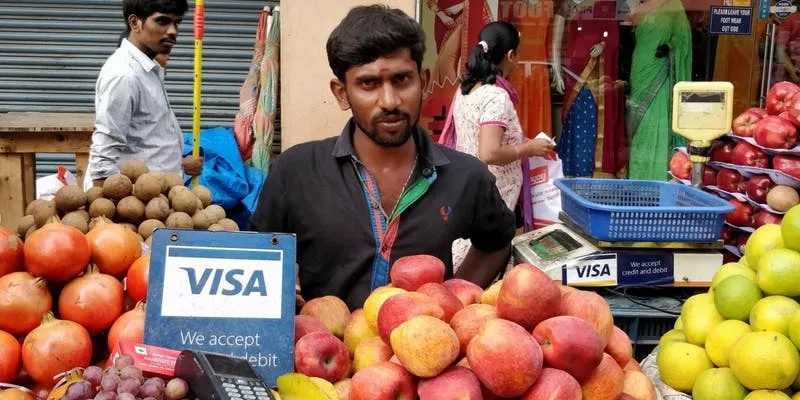These five startups are taking fintech to the last mile
In a country of 132 crore people, financial inclusion is not an easy task. However, these five startups are making inroads in taking digital fintech to the last mile.
The financial inclusion story in India is far from a reality. Rather, it seems to be just getting started.
In India's 132 crore population, CRISIL states that less than 20 crore have taken a loan from either a bank or any microfinance institution. Further, only 34 crore hold an insurance policy. Despite these dismal figures, or maybe because of them, the country continues to show promise.
The Global Findex Report by the World Bank states that close to four-fifths of Indian adults had bank accounts by 2017, and 36 percent of account owners use these accounts to either make or receive digital payments.

Catalyst, an initiative funded by USAID, recently launched a new business incubator branded under ‘Fintech for the Last Mile.’ It aims to support new entrepreneurs focused on developing innovative, scalable digital finance solutions for mass, complex use cases.
Housed within non-profit IFMR LEAD, the initiative aims to expand digital payments and financial inclusion in India, especially for small merchants and low-income consumers. Catalyst's Head of Innovation Badal Malick says that in February, the first batch out of the incubator included the five high-caliber startups that were formally inducted for a six-month programme.
“These incubates were chosen based on a three-stage rigorous selection process that drew more than 50 applicants through qualified leads, including VCs, incubators, universities as well as key partners. The chosen fintech solutions are geared for areas of retail and supplier payments, goal-based savings, hyperlocal retail of financial services, micro-ERP solutions, and new credit models,” adds Badal.
He explains that these models combine context-appropriate technology, innovative pricing models, cost-effective go-to-market and onboarding templates, and impact-based partnerships. For post validation, Catalyst creates linkages with broader agencies to institutionalise and scale these models, and advocates for enabling policy and regulations.
The programme is supported with a fund of $50,000, courtesy USAID, for each fintech startup to test its solutions with additional support of market access, expert mentorship, technology infrastructure, action learning, and key stakeholder connects.
Apart from the funding, the startups with the programme are mentored by thought leaders, including Alok Mittal, CEO at Indifi and former MD of Canaan Venture Partners, Sanjay Swamy MD at Prime Ventures, Rohan Angrish, Head of Innovation at ICICI and former CTO at Capital Float, among other prominent names.
This first batch of startups with the ‘Fintech for the Last Mile’ incubator include:
Kaleidofin
Started by ex-IFMR executives, Kaleidofin is a financial platform for the informal sector that provides solutions tailored to the customer’s goals.
It leverages the full India Stack, existing networks, analytics, structuring and user-centred design to drive outcomes for customers, in the process, they will also help enrich the digital asset of each such customer.
The focus of this intervention is for Kaleidofin to develop and test its financial planning platform with low-income communities in Jaipur. They will do this by driving adoption with 1,000 low-income individuals, of which 500 will use their platform for financial planning and investments.
The company has raised $2.8 million as a part of its seed round led by Silicon-Valley based Omidyar Network, along with participation from Blume Ventures and individual investors including Israeli serial entrepreneur and inventor Shlomo Ben-Haim.
PayBee
Paybee automates and digitises B2B collections in the distributor-retailer value chain. Paybee is currently working with business partners in Chennai and Jaipur, and has on-boarded 350+ businesses.
With over 70 percent of the business transactions being done with cash and cheques, and with roughly about the same percentage of businesses being unorganised, they believe the opportunity and potential for Digital India and financial inclusion is tremendous. It is looking to expand its services across verticals and geographies.
MeraPaper
MeraPaper plans to build a digital ecosystem of newspaper distributors and customers by automating newspaper billing for distributors and offering other technology solutions such as customer management, product management, and payment records.
Customers also stand to gain from MeraPaper by accessing newspaper and magazine subscription services at their fingertips. The Merapaper mobile application aims to revolutionise the time-intensive, cash-dependent and high-frequency payment collection process.
PayNearby
PayNearby operates on a B2B2C model, by partnering with neighbourhood retail stores that offer assisted digital financial services like Aadhaar ATM, Aadhaar deposit, SMS payment, khata service, utility payment, prepaid cards, mutual funds & insurance, money transfer, hyperlocal services and payment services like Bharat QR and Unified Payments Interface (UPI) using the PayNearby app.
PayNearby’s solutions are modelled to make financial transactions seamless, quick and easy, and strive to empower the firm’s retailer partners. PayNearby aspires to empower 20 lakh stores across Tier I and Tier II cities in India. The stores will serve as a catalyst to digitise cash, so that the mass market customer can benefit from fintech services that were hitherto available only to customers having digital money.
FingPay
Fingpay allows customers to shop without cards, cash, mobile and wallets. With Fingpay, customers can pay for products, services and utilities at PoS (Point of Sale) from any of their bank accounts or wallets with just a fingerprint scan.
FingPay has integrated Aadhaar Enabled Payment System (AEPS), Bharat Bill Payment System (BBPS) and UPI in a single merchant application. The focus of Fingpay is in payments using biometrics. It facilitates biometrics-based payments for all and is focused towards financial inclusion. Here the payments are made digitally, using bank accounts. The customers authenticate through biometrics and their accounts are debited. Through this solution Fingpay is encouraging people to use digital payments.
Recently, ICICI Bank invested in FingPay for a stake in the firm.
Players like Kalaeidofin face competition from banking veteran Manish Khera's newest venture Arth Impact, while oterhs like Inkredo, Kyepot and Gradufund are helping digital payment businesses in low-income geographies get access to formal loans directly through mobilephones.







